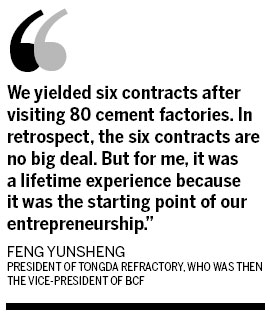Old-line SOE reinvents itself in new material industry
Updated: 2013-07-04 07:51
By Zheng Yangpeng (China Daily)
|
|||||||||||
The roots of many of the tens of thousands of high-technology companies in Beijing's Haidian Science Park lie in university laboratories or researchers' ventures. But many others are traditional State-owned enterprises that have found new lives through restructuring.
Tongda Refractory Technologies Co Ltd is one of these companies.
Its origins lie in the Beijing Ceramics Factory, which was formed in 1958. Affiliated with Beijing's Building Material Bureau, it was a typical product of Mao's era, with a mission to produce building material for the capital's socialist construction.
But as China embarked on the reform and opening up path and was exposed to the international market, the old factory found itself adrift. Its technology and products lagged far behind its counterparts in foreign countries. To survive, BCF linked up with Japan's TOTO Ltd, which had leading technology in the field.
"But we soon found the joint venture was not realistic, because the gap between us was too large. They were like college students while we were like primary school students," said Feng Yunsheng, president of Tongda Refractory, who was then the vice-president of BCF.
So in 1992, the Chinese company chose to buy technology from TOTO, establishing China's first high-end toilet production line. The business went unexpectedly well, lifted by demand from a boom in Beijing's hotel business.
In 1994, BCF's best assets were merged with TOTO. The Japanese company took a 70 percent stake in the joint venture, while the remainder went to BCF. However, not all BCF's employees joined the JV, and as a socialist SOE, BCF had to find jobs for them. Tongda Refractory was set up for this purpose.
With its original major business having been assigned to the JV, what were the leftover staff to do? Feng had to answer the question.

With a "sink or swim" attitude, Feng took on a venture full of uncertainty. He and his workers bought new equipment and developed technologies, aiming to produce high temperature-resistant materials for the then-booming cement industry.
For his team, the toughest job turned out to be finding clients for their products. They were totally new to marketing.
Feng recalled a time when he had to mail product introductions one by one to potential customers. In a time without the Internet, he traveled across the country, knocking on each cement factory's door, just to get a contract.
"We yielded six contracts after visiting 80 cement factories. In retrospect, the six contracts are no big deal. But for me, it was a lifetime experience because it was the starting point of our entrepreneurship," he said.
Tongda's national business expanded, from cement to chemicals, from steel to coal-fired power stations, to virtually all high-temperature industries.
Sales rose from less than 1 million yuan ($161,000) initially to nearly 1 billion yuan in 2012, surpassing those of the JV with TOTO.
Feng said Tongda's success lay in its emphasis on talent and innovation. He still remembers having to spend hours persuading a college graduate to work in his company, after having delivered a resume in hope of getting a job at TOTO.
Feng said his business is both a traditional industry and an emerging one. As 60 to 70 percent of China's primary energy is consumed by high-temperature industries such as cement, steel and metallurgy, any improvement in refractory materials is good news for the nation's energy conservation and pollution reduction.
Related Stories
SOEs need to improve management: auditor 2013-06-28 00:43
SOE revenue growth gains pace 2013-06-19 20:39
Profits for China's SOEs up 6.5% in first 5 months 2013-06-19 19:51
Funding pro specializes in SOEs 2013-06-17 07:36
Experts call for break-up of SOE monopoly on debt concerns 2013-05-29 08:03
Today's Top News
Woman executed for drug trafficking
Shanghai gets go-ahead for free trade zone
Obama, Merkel agree talks on surveillance program
China urges more efficient uses of fiscal funds
Egypt army topples president Morsi
Pilot flight for Internet on Air China services
Frankfurt aims to be key yuan center
China boosts handling of nuke emergencies
Hot Topics
Lunar probe , China growth forecasts, Emission rules get tougher, China seen through 'colored lens', International board,
Editor's Picks

|

|

|

|

|

|





